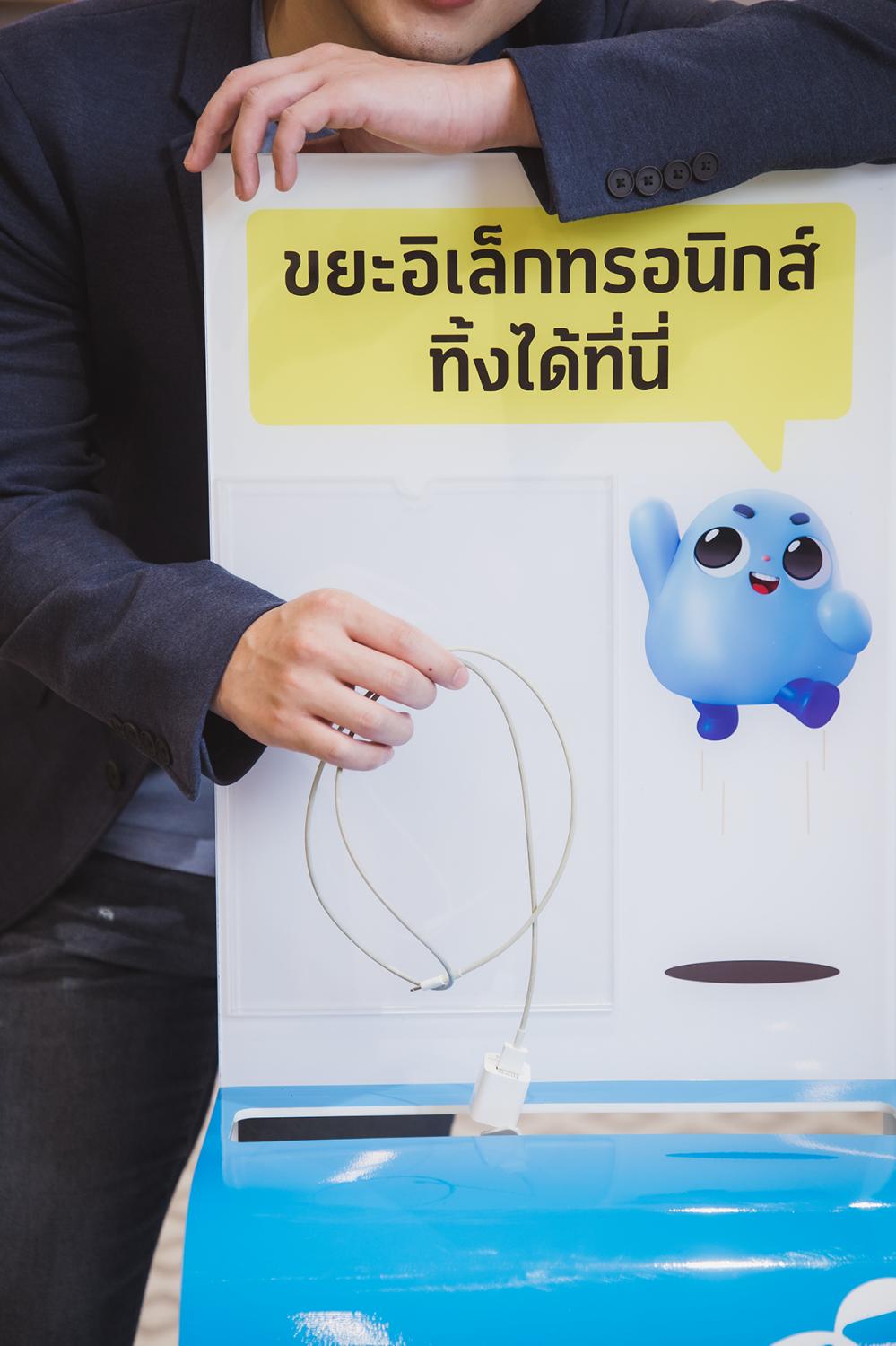As Millennial customers and investors become more environmentally conscious, mobile industry players must be careful with the materials they use in phones, including supporting proper e-waste disposal.

A person drops a charger cable in a disposal box provided by DTAC. Telecom companies are promoting proper disposal of electronic waste.
"Thailand has a high mobile internet penetration rate with 93.7 million phone numbers, accounting for 133% of its population," said On-uma Rerkpattanapipat, head for communication and sustainability of Total Access Communication (DTAC), the country's third largest mobile operator by subscribers.
Some 14.1 million smartphones are sold in Thailand every year, including 100,000 for first-time users and the rest for those seeking replacements. Replacements alone represent 20% of Thailand's total phone purchases on a yearly basis.
PROPER DISPOSAL
A sustainable disposal system is the key to handling the growing amount of e-waste, which can protect the environment and consumer health while some reselling some valuable components in devices such as copper, she said.
Removing data in devices before they are recycled is also important, said Ms On-uma.
By 2022, the typical consumer is predicted to own more than five connected devices, excluding connected items at home, she said.
"Investors and young customers expect firms to show environmental responsibility. This is not only corporate social responsibility for brands, but also a sustainability measure for brands," said Ms On-uma.
DTAC rolled out its "Think Hai D" (proper disposal) campaign, which enables customers to discard their unused mobile phones at 51 shops.
DTAC is also working with partners to support drop points.
Peerapol Chatanantavej, head of device portfolio and expertise at DTAC, said people tend to change their mobile phones quickly in favour of the newest technology.
The upgrade cycle of smartphones is accelerating to 18-24 months, changing from 24-36 months, he said.
Leading mobile operator Advanced Info Service (AIS) is working with 82 organisations to set up around 2,000 e-waste drop points.
AIS also wants to increase public awareness on the proper disposal of e-waste.
Revenue derived from e-waste will be donated to the Chaipattana Foundation, AIS indicated.
INNOVATION FOR SUSTAINABILITY
Suthipong Amornpradit, product manager at Oppo Thailand, the local operating unit of the Chinese smartphone maker, said the company has a policy of reduced plastic use in packaging, which was pioneered in the EU market.
For example, plastic trays are replaced by paper, which is made of residue from bagasse and bamboo, instead of raw wood pulp.
He pointed to the Oppo Reno 4 handset, which reduced its plastic packaging by more than 90%.
Oppo products are in compliance with the Restriction of Hazardous Substances, an EU directive that describes a list of harmful chemicals that should not be in products, said Mr Suthipong.
CIRCULAR ECONOMY
Kalaya Kovidvisith, co-founder of Fab Cafe, a creative digital hub, said the principles of product design cover function, aesthetics, ergonomics, construction, costs and materials.
Other factors that can drive product trends include product owners, marketing, technology and consumer needs, she said.
In recent years, pricing and fashion have become priorities, which have arrived in tandem with drastic growth in waste, said Ms Kalaya.
The Thai government said it wants to transform the business models and operations used here towards a circular economy, as demand for green consumption grows and companies continue to develop innovative ways to use waste and byproducts.
A circular economy is an economic framework that focuses on carefully managing resources so nothing is wasted.
Products and materials are kept in use -- reused, remanufactured and recycled continuously -- or as long as possible to achieve maximum value.
A group of material scientists are gearing up efforts to develop innovative materials, she said.
"We will see a big shift in material trends from electronic-based materials to biodegradable materials over the next 5-10 years," said Ms Kalaya.
